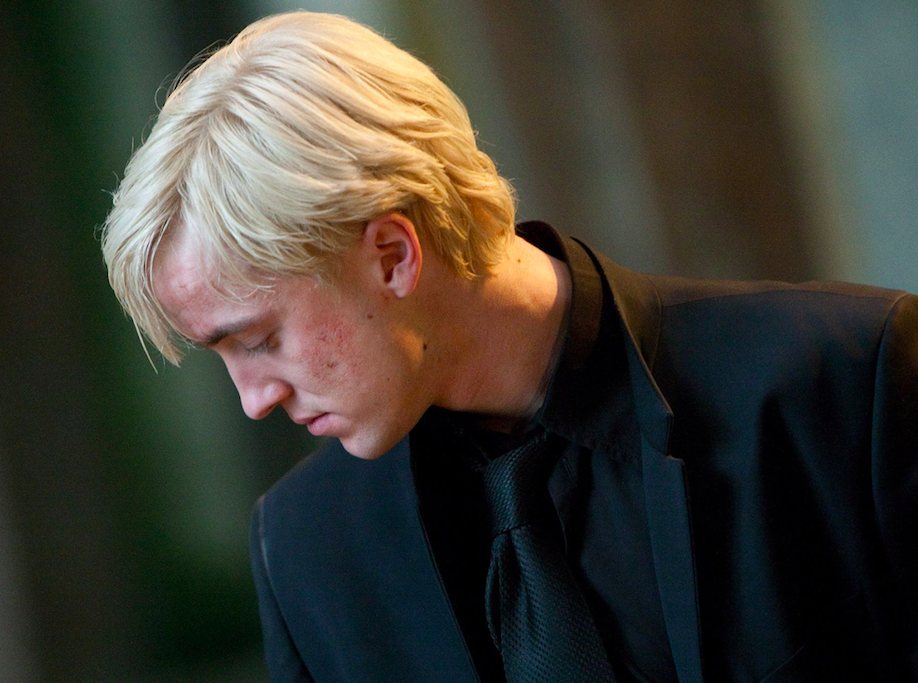Opinion — Draco Malfoy deserved a redemption arc
Although it’s been nearly nine years since the final release of the Harry Potter films and almost 13 years since the conclusion of the book series, fans continue to debate and craft the wizarding world to their heart’s desire. The addition of spinoff series such as “Fantastic Beasts and Where to Find Them” and “The Cursed Child” have only expanded the world more. Even now, author J.K. Rowling continues to update the wizarding world with articles on her site.
The world of Harry Potter and friends was a big part of my childhood; I saw all the movies, read all the books, even got the opportunity to visit Diagon Alley in Orlando Studios and get a replica of Hermione’s wand. Even now, when I’m stressed and want to escape to a fantasy world, I pick up my “Harry Potter” books and dive in.
The world had never been perfect; I disagreed with several of the choices Rowling made both in and outside the world. But something that never sat right with me was the ending for Draco Malfoy.
For those who do not remember, Draco Malfoy was the only child of Lucius and Narcissa Malfoy. He was told he was exceptional as a pure-blooded wizard and a Malfoy. He was told the Dark Lord’s return meant wealth and fame for his family and he was destined to become his father. When Harry Potter turned down Malfoy’s offer of friendship, it became clear Potter would not contribute to the rise of Voldemort.
At Hogwarts, Draco began to realize he was not as special as he was told. I like to compare Draco’s realizations to a child raised in an extremely one-sided household; you are taught right from wrong, raised with specific reactions, specific beliefs and the ideologies of your parents. Not until you do your own research and see the world with your own eyes do you conclude that maybe your parents weren’t 100% right. Of course, this does not excuse Malfoy from being an insecure, supremacist bully, but it does help the reader understand why he did what he did.
Malfoy was loved, that much is obvious. His mother cared deeply about him but was often manipulated by the actions of Lucius, who in turn manipulated their child. Draco knew right from wrong, but his idea of right and wrong was based on the one example he had: his father.
His father told him pure-blooded wizards were superior. This led him to bully muggle-born and half-blood students. His father told him Dumbledore was useless, so he criticized the Hogwarts headmaster. His father told him he needed to be protected and ready for the return of Voldemort, so, like his father’s Death Eater friends, he recruited the help of Crabbe and Goyle, both of whom were not considered friends, but bodyguards.
In addition, Lucius showed his love by spoiling his son. When Draco wanted to be on the Quidditch team, Lucius made that happen. It seems, at least to me, Draco’s relationship with his father was strictly superficial. Lucius often shared his sentiments about Voldemort with his son, creating a false narrative, a future Draco expected that would never come.
In his first year, Harry was told what he was destined to be and what to expect while attending Hogwarts (i.e., Voldemort’s return, Harry’s weird relationship with him, the Horcruxes, etc.). Meanwhile, Draco was blissfully ignorant. He bullied for attention because, deep down, he was insecure about his own success, his own failures, that somehow he was always beat out by the “boy who lived.”
In the “Chamber of Secrets,” Lucius says to Draco, “I would remind you that it is not – prudent – to appear less than fond of Harry Potter, not when most of our kind regard him as the hero who made the Dark Lord disappear.”
This is Draco’s first act of defiance; he despises Harry Potter against his father’s wishes. He continues this act of defiance by attempting to get Harry in trouble at every turn, whether it be sharing information with Rita Skeeter during the Triwizard Tournament or joining Umbridge’s Inquisitorial Squad to take away points and end Dumbledore’s army.
Draco’s rivalry with Harry was, for the most part, based on envy. It was shallow, skin deep, meant to punish Harry for turning down Draco’s friendship. Things did become physical, such as in the “Half-Blood Prince” when Draco breaks Harry’s nose, but it always came back to Draco’s insecurity and jealousy. Draco had no intent to kill Potter or cause his ultimate demise. This can be seen in the “Deathly Hallows” when Draco is asked to identify Harry so Lucius can call Voldemort in.
“‘Well, Draco?’ said Lucius Malfoy. He sounded avid. ‘Is it? Is it Harry Potter?’”
“‘I can’t – I can’t be sure,’ said Draco.”
But he’s here with the Weasley kid and Miss Granger, Lucius goes on to say. Draco is adamant that he can’t be sure. I believe this is because Draco knew Harry was the only one who could stop Voldemort. He was a 17-year-old kid way in over his head.
Let’s head back a year to the events that take place in the “Half-Blood Prince.” Lucius, captured and sent to Azkaban, fails the Malfoy name. Draco is eager to take his father’s place and finally prove he is special, just like he was told his whole life. His time at Hogwarts proved otherwise, adding to his insecurities, but this was his moment, his time to shine. Draco is, once again, blissfully ignorant of what he just signed up for.
That is obvious not only in the books but also in the movies. Tom Felton does a fantastic job showing the mixed emotions Draco is suffering from. He’s lost in thought, his mouth occasionally quivering and he’s absent from schoolwork, prefect duties and quidditch. He’s panicking.
Let me irradiate that Draco is not flawless. He is, for the most part, a spoiled brat. He is not some hot-shot bad boy; he’s insecure, cowardly and ignorant of what Harry Potter has been doing this whole time. Although the gears are turning and the change of thought is coming, he’s still lashing out at those around him. He’s in pain.
The books describe Draco’s physical appearance as he begins to interpret reality. Harry “now saw that Malfoy had dark shadows under his eyes and a distinctly grayish tinge to his skin.” Whatever was happening, it was stressing him out.
When he thinks repairing the vanishing cabinet will be impossible, Draco accidentally hexes Katie Bell with a dark artifact he intended to reach Dumbledore. He also unintentionally poisons Ron with a bottle of Slughorn’s mead, once again, intended for Dumbledore. The scene of Draco coming to terms with his actions and the consequences has him in a flat out panic attack, one that Harry promptly makes worse by entering. The movies show Harry using Snape’s “sectumsempra” spell, ripping Draco’s body open with lacerations. The books show this is Harry’s response to Draco beginning the incantation for the “crucio” curse, which I think would not have worked anyway. To use the unforgivable curses is to have mal intent, intent to harm and kill, which Draco does not have.
Later, when confronted with his task to kill Dumbledore, Draco is unable to do it.
Dumbledore retorts, “You are no assassin,” to which Draco replies, “How do you know what I am? I’ve done things that would shock you.” He’s attempting to prove that he can follow in his father’s footsteps, despite his internal battle with morality.
He then proceeds to show Dumbledore the dark mark Voldemort cursed him with.
“Don’t you understand?” Draco cries out, “I have to do this. I have to kill you, or he’s going to kill me.”
Even presented with a task to save his family, he can’t do it. Draco doesn’t lack the empathy or morality his father or the rest of the Death Eaters do. Faced with reality, Draco finally understands his whole life, his whole system of “right and wrong,” is not correct. He was just a manipulated boy.
Rowling is adamant that Malfoy didn’t deserve a redemption arc because there was never a “heart of gold” underneath his pompous act. Yet, she gave that redemption to a character she said was morally grey; a man who bullied children and killed because of a girl who rejected him years before.
Draco was horrible, but partially through learned behavior. In little ways, he defied the reality constructed around him, a reality that was not a reality to the rest of the world. Rowling allowed his character to reflect on his childhood and start new, leading his son and wife away from prejudice and toward tolerance. While Harry had support and friends that loved him, Draco had nothing. His friendships were shallow, his father was superficial and he had to learn about the world by himself.
If anyone had said to Draco not to cross to the other side, perhaps he would have stayed. Perhaps he would have helped the students from afar because he was still too cowardly to pull a Neville Longbottom. Without Harry, Draco would have perished.
Yet, without Draco, Harry would have perished too.
Draco should have been proof we can be forgiven for our mistakes if we actively try to better ourselves. He deserved redemption for suffering through the consequences of his father and his own behavior.
His childish wish of becoming a Death Eater like his father was broken when he realized it was just that: a childish fantasy. The children at Hogwarts had to grow up too fast, Draco included. At 17, he had the pressure of an entire fascist organization on his shoulders, just like Harry had the entire fate of the wizarding world on his. They were more alike than you would think, yet Draco was left behind.
We will never get a redemption arc for the boy who changed, at least not from Rowling. Despite all the choices she made that I disagree with, the books were written and that’s that. I just hope the discussion of the Harry Potter series will live on through the public domain.

Sydney Dahle is a fourth-year student studying history and political science at Utah State and is currently the Lifestyles Content manager for the Utah Statesman. She hails from St. Louis, Missouri, and spends her free time writing and listening to music.
@dillydahle


Draco was no Snape.